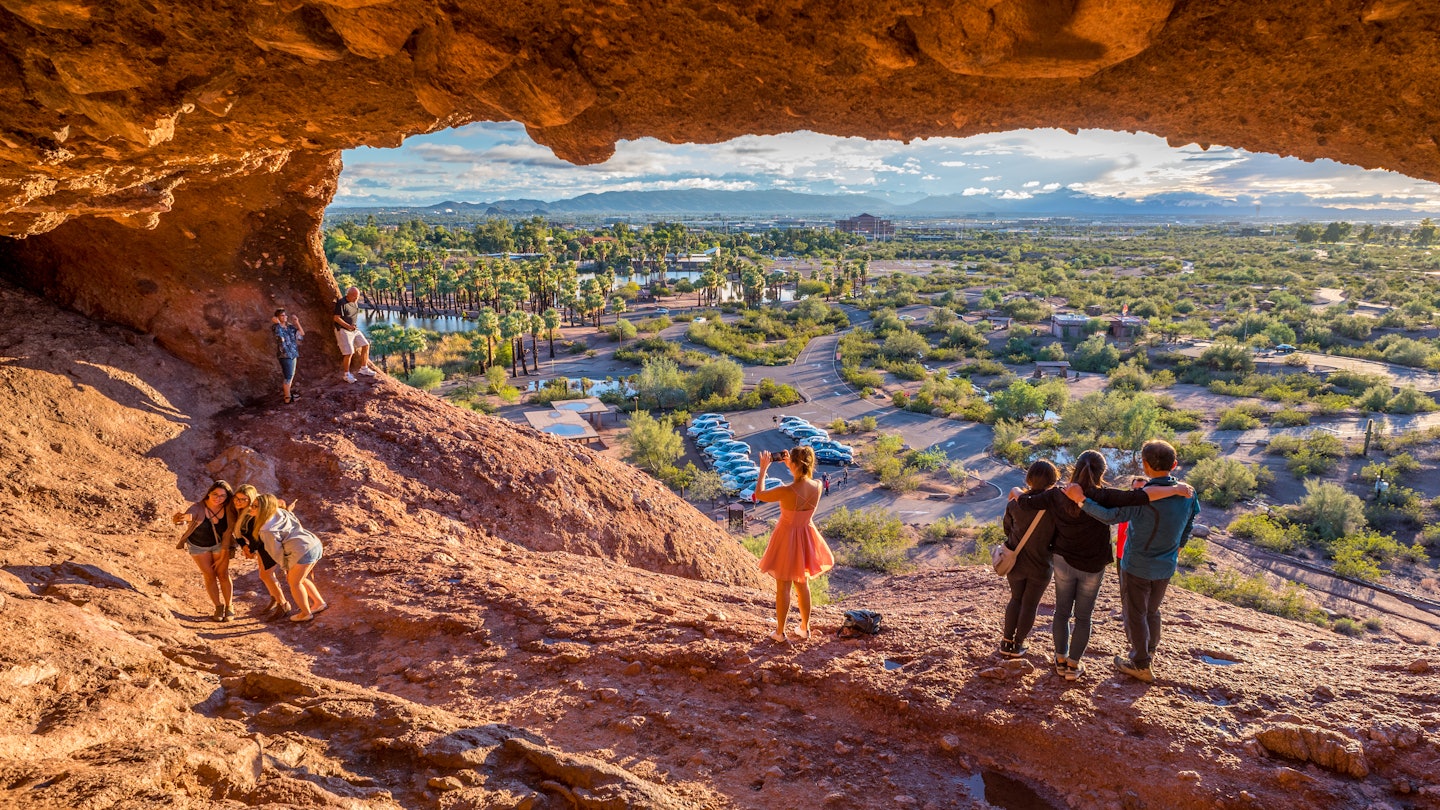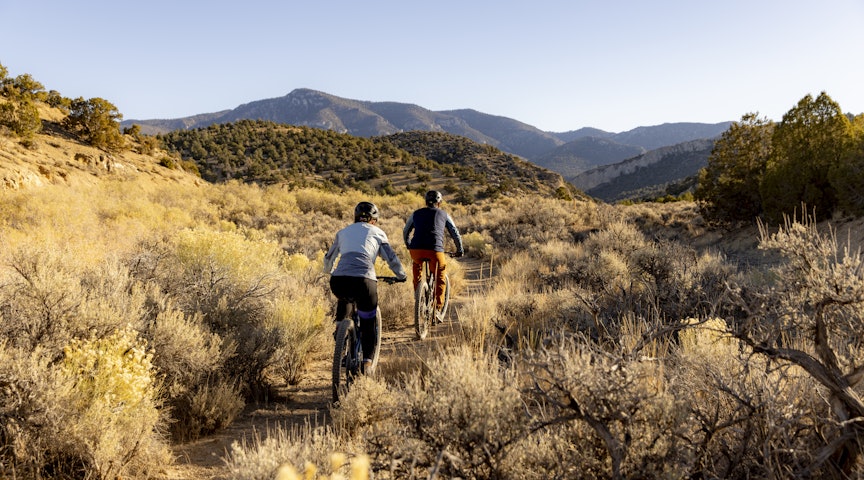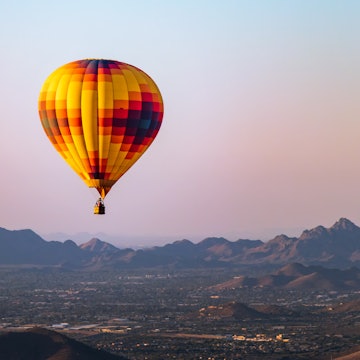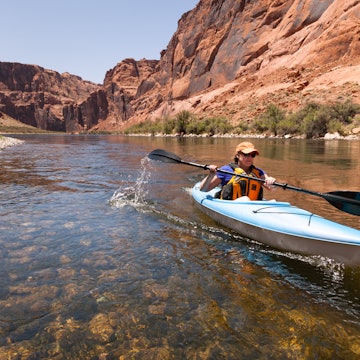
Road, rails and trails: the best ways to get around Phoenix, Arizona

Nov 3, 2021 • 4 min read

Natural wonders such as the Hole-in-the-Rock edge into the city in Phoenix © Shutterstock / Gregory E. Clifford
Looking at the sophisticated metropolis of Phoenix, Arizona, it's hard to imagine that this was once a peaceful agricultural area composed of small villages divided by irrigation channels carved out of the Sonoran Desert by Indigenous Hohokam people more than 2000 years ago.
Today, Phoenix’s 1.62 million people (4.85 million if you include everyone in Greater Phoenix) inhabit a sprawling mass of 24 municipalities and scenic sites nicknamed "The Valley of the Sun."
Downtown Phoenix (and neighboring urban centers, Scottsdale, Tempe and Mesa) have public transportation, but if you’re hoping to hike up Camelback Mountain or watch the Cactus League’s spring training at the city's 10 stadiums and ballparks, it’s easier to explore in your own vehicle. Gas prices are considerably cheaper in Arizona than in nearby California and Nevada.
From the best forms of transportation to making the most of your travel time, here's a guide to getting around in Phoenix.

Car and Motorcycle
A rental car will give you the freedom to explore this massive city’s considerable charms. All the major car rental agencies are represented at Phoenix Sky Harbor International Airport and Phoenix-Mesa Gateway Airport, and many have downtown offices in urban centers. Be sure to compare prices before booking.
Daily rates for renting a compact car (including taxes, fees and unlimited mileage) range from $60 to $80 on weekdays, but prices can almost double at weekends. If your budget is tight or you don’t need a car for your whole trip, consider using a ride-hailing service such as Uber or Lyft, or try Turo, a public car-sharing marketplace.
Despite motorcycles being a great way to enjoy Arizona’s glorious stretches of open road, few of the big rental companies in Phoenix offer them. But plenty of small, local companies can outfit you with two-wheeled machines, along with off-highway vehicles (OHV), which are street legal in Arizona.
Phoenix is a tourist magnet year-round thanks to its near-perfect weather but summer monsoons (July to early September) bring torrents of rainfall, generally in the afternoon. Although roads are well-maintained, motorcyclists in particular should remember to wear the appropriate safety gear. Helmets aren’t legally required for riders over 18, but you don't want to think about coming off your motorcycle without one.

Bus
Phoenix’s Valley Metro buses ($2 for one ride; $4 for a day pass) link up with its light rail services, creating a seamless and sustainable way to get around the city. Buses are a hassle-free option for exploring and you can watch city life unfold from the comfort of an air-conditioned vehicle – a welcome luxury, especially in summer.
Although there are some rural routes, service to outlying destinations isn’t as convenient or reliable as it is in urban areas. If you’re yearning to roam beyond Greater Phoenix to check out sites such as Saguaro National Park in Tucson, the long-distance FlixBus offers easy transfers between Arizona’s big cities. Trips are affordable too: a ticket from Phoenix to Tucson is only about $12.
Light rail and Streetcar
Navigating downtown and Greater Phoenix by car can be a challenge even for experienced drivers. Luckily, taking the Valley Metro Rail lets you avoid the city’s inevitable traffic jams. Charging $2 for a one-way ticket or $4 for an all-day pass, the light rail network wends through central and downtown Phoenix.
Light rail trains also serve nearby Tempe (which has its own electric streetcar line) and Mesa, stopping along the way at spots such as the Pueblo Grande Museum and Archaeological Park and Chase Field, where you can watch the Arizona Diamondbacks play baseball. A bonus: $8 million worth of public art adorns the Valley Metro’s 38 stations.

Bike
Greater Phoenix’s car-centric culture is slowly shifting toward cycling, with almost 600 miles of designated bike lanes and routes, plus 100-plus miles of paths and off-street trails. Exploring Phoenix’s historic Willo district downtown by bike is an exhilarating experience, tracing some of the city's most beautiful streets without the worry of navigating traffic or paying for parking.
Although Phoenix no longer has a bike-share program, Old Town Scottsdale has a popular bike-sharing scheme, and companies offering rentals and guided cycle tours are easy to find in Greater Phoenix. Many hotels also offer complimentary bicycles for guests.
Don't overlook the surrounding desert – Phoenix has some excellent mountain biking trails, including the famous National Trail at South Mountain Park.
Walking
When the weather is balmy, strolling Phoenix’s cool neighborhoods and seeking out city parks on foot is a great way to take in the local vibe. While most people still prefer the flexibility of driving, Phoenix and the urban areas of Old Scottsdale and Tempe are some of the state’s most pedestrian-friendly spaces.
Be sure to check out the walking trails in areas of urban wilderness such as South Mountain Park and North Mountain Park.
Accessible transportation in Phoenix
In Greater Phoenix, the Valley Metro ADA Paratransit system provides a range of accessible transportation options, including ramps, lifts and “kneeling” buses that make it easier for people using wheelchairs and scooters to board.
Light-rail stations have level pathways near entrances and platforms, along with other accessibility features such as raised print, braille and audible vending machines. See Lonely Planet's Accessible Travel Resources for more tips and information on accessible travel.
You may also like:
15 free things to do in Phoenix
The ultimate guide to a weekend in Phoenix, Arizona
The 12 best day trips in the US Southwest
Take your United States (USA) trip with Lonely Planet Journeys
Time to book that trip to United States (USA)
Lonely Planet Journeys takes you there with fully customizable trips to top destinations – all crafted by our local experts.
























